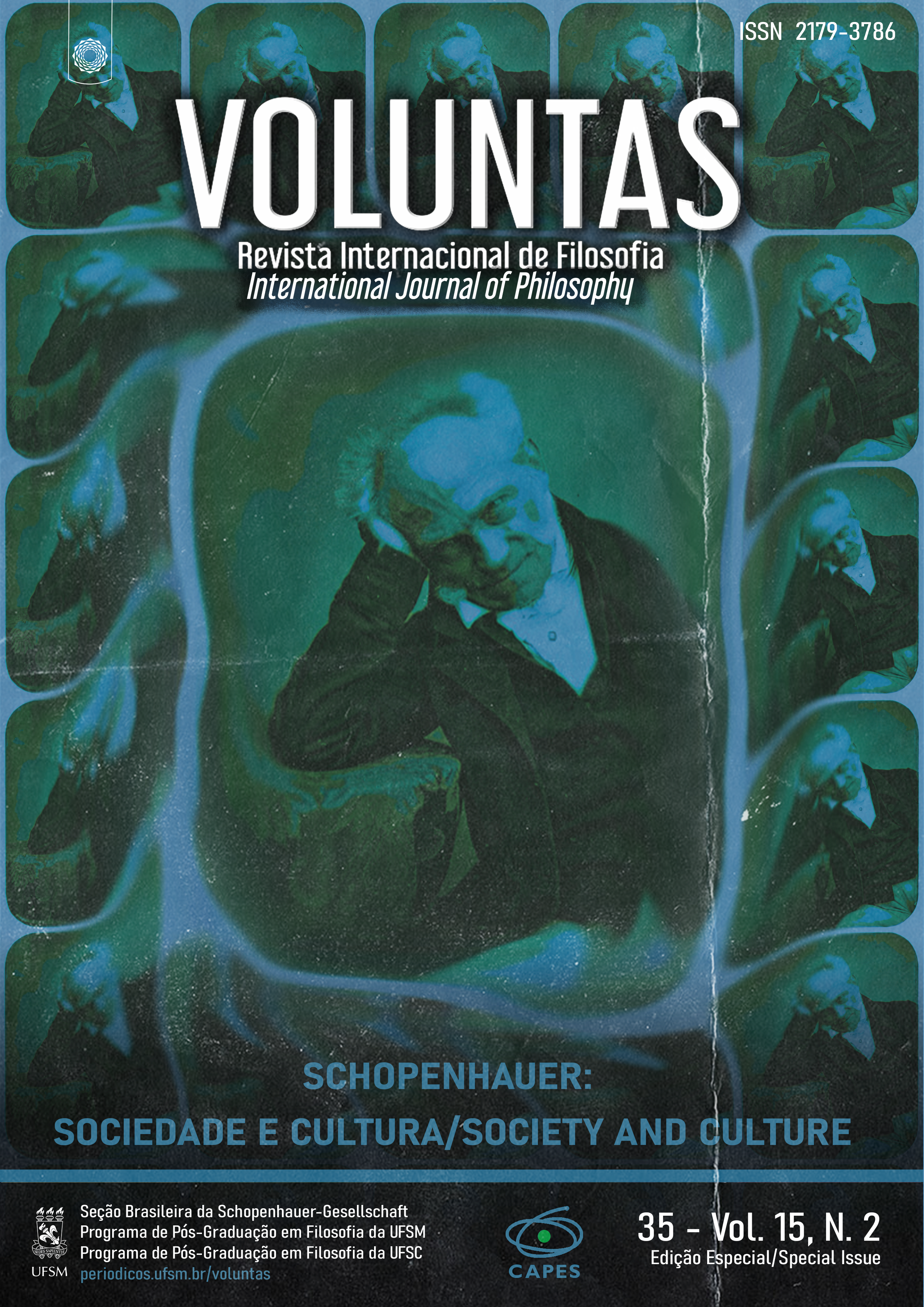How the theory of knowledge influences ethics: the downfall of human supremacy through Schopenhauer’s critique of Kant’s notion of diginity
DOI:
https://doi.org/10.5902/2179378688802Keywords:
Knowledge, Understanding, EthicsAbstract
Schopenhauer's great innovation in the theory of knowledge is intrinsically related to the moral issue concerning the effective consideration of non-human animals. The role of the intellect is central to Schopenhauer and does not receive the same value in Kant. In this way, Schopenhauer criticizes the Kantian notion of dignity, based on the exaggerated valorization of reason and the notion of autonomy. For Schopenhauer, every being endowed with understanding and will is worthy because it operates intuitively and in accordance with the law of motivation. Those who operate using intuition operate according to motives, a concept that brings Schopenhauer and bioethics theorists such as Richard Ryder and Peter Singer closer to one another. For Singer, the notion of interest is sufficient for us to treat animals with dignity. Thus, the central purpose of this paper is to demonstrate that Schopenhauer’s theory of knowledge - built on his critique of Kant - settles the ethics of relations between humans and non-rational animals.
Downloads
References
BARBOZA, Jair. Considerações, acompanhadas de um excurso estético, sobre a dignidade da natureza e dos animais na ética não-antropocêntrica de Schopenhauer. In: PAVÃO, Aguinaldo; FELDHAUS, Charles; WEBER, José Fernandes (Orgs.). Schopenhauer: metafísica e moral. São Paulo: DWW Editorial, 2014. p. 21-33.
CACCIOLA, Maria Lucia de Oliveira e Melo. Schopenhauer e a questão do dogmatismo. São Paulo: EDUSP, 1994.
FERRY, Luc. A nova ordem ecológica: a árvore, o animal e o homem. Trad: Rejane Janowitzer. Rio de Janeiro: Difel, 2009.
KANT, Immanuel. Crítica da Razão Pura. Trad: Valerio Rohden e Udo Baldur Moosburger. São Paulo: Nova Cultural, 1996. (Coleção Os Pensadores).
KANT, Immanuel. Fundamentação da Metafísica dos Costumes. Tradução: Paulo Quintela. Lisboa: Edições 70, 2007.
LEBRUN, Gerard. O subsolo da Crítica: uma conferencia inédita de Lebrun sobre Kant. Discurso, São Paulo, v. 46, n. 2, p. 53-84, jul-dez. 2016. Disponível em: <http://www.revistas.usp.br/discurso/article/view/123669>. Acesso em: 25 jul. 2020.
LEFRANC, Jean. Compreender Schopenhauer. 5. ed. Trad: Ephraim Ferreira Alves. Petrópolis: Ed. Vozes, 2011.
OLIVEIRA, Wesley Felipe de. A Importância Moral da Dor e do Sofrimento Animal na Ética de Peter Singer. 2012. 250p. Dissertação (Mestrado em Filosofia) – Programa de Pós-Graduação em Filosofia, Centro de Filosofia e Ciências Humanas, Universidade Federal de Santa Catarina, Florianópolis, 2012.
RYDER, Richard Dudley. Speciesism in the Laboratory. In: SINGER, Peter (Ed.). Defense of Ani-mals: the second wave. Oxford: Blackwell Publishing, 2006. Pp.87-103.
SCHOPENHAUER, Arthur. O Mundo como Vontade e como Representação: primeiro tomo. Trad: Jair Barboza. São Paulo: UNESP, 2015a.
SCHOPENHAUER, Arthur. Sobre o Fundamento da Moral. Trad: Maria Lúcia Mello Oliveira Cacciola. 2. ed. -São Paulo: Martins Fontes, 2001.
SINGER, Peter. Libertação Animal. Tradução: Marly Winckler. Revisão técnica: Rita Paixão. Porto Alegre: Lugano, 2004.
SINGER, Peter. Utilitarianism and Vegetarianism. Philosophy & Public Affairs, Oakley, v. 9, n. 4, p. 325-337, 1980.
Published
How to Cite
Issue
Section
License
Copyright (c) 2024 Jaqueline Engelmann

This work is licensed under a Creative Commons Attribution-NonCommercial-ShareAlike 4.0 International License.
The submission of original manuscripts to this journal implies the transference, by the authors, of the copyrights for printed and digital publication. The copyrights of a published manuscript belong ultimately to the author, and only the copyright for its first publication is reserved to the journal. Authors may only use the same results in other publications explicitly indicating this journal as the medium of the original publication.
Licence
Attribution-NonCommercial-ShareAlike 4.0 International (CC BY-NC-SA 4.0) - This license lets others remix, tweak, and build upon your work non-commercially, as long as they credit you and license their new creations under the identical terms.






